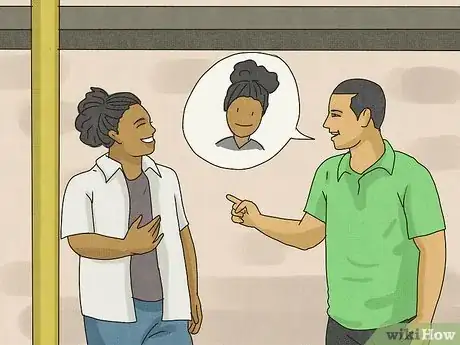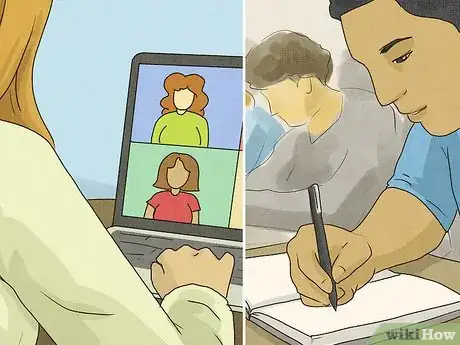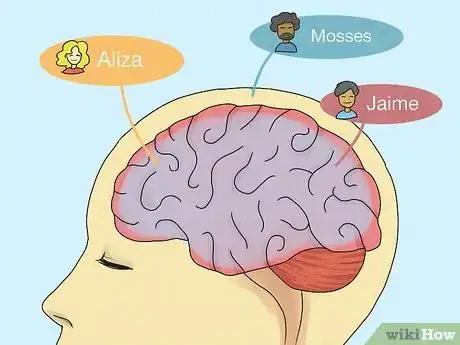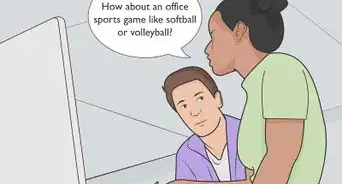This article was co-authored by Kelli Miller, LCSW, MSW and by wikiHow staff writer, Janice Tieperman. Kelli Miller is a Psychotherapist based in Los Angeles, California. Kelli specializes in individual and couples therapy focusing on relationships, depression, anxiety, sexuality, communication, parenting, and more. Kelli also facilitates groups for those struggling with alcohol and drug addiction as well as anger management groups. She is the author of “Professor Kelli’s Guide to Finding a Husband” and the award-winning and best-selling book “Thriving with ADHD”. Kelli co-hosted an advice show on LA Talk Radio and is a relationship expert for The Examiner. She received her MSW (Masters of Social Work) from the University of Pennsylvania and a BA in Sociology/Health from the University of Florida.
There are 13 references cited in this article, which can be found at the bottom of the page.
wikiHow marks an article as reader-approved once it receives enough positive feedback. This article received 17 testimonials and 84% of readers who voted found it helpful, earning it our reader-approved status.
This article has been viewed 727,438 times.
Good social skills are an important part of building rich friendships, enjoying yourself in public, and succeeding in your career. If you consider yourself to be shy, you might run into some trouble chatting with people you don’t know. Don’t worry—there are plenty of easy, subtle ways to improve your social skills throughout your daily life. Here are a few tips and tricks to help you get started.
Steps
Expert Q&A
Did you know you can get expert answers for this article?
Unlock expert answers by supporting wikiHow
-
QuestionI suffer from SAD (Social Anxiety Disorder). How can I be better at talking to people when I truly can't help it?
 Paul Chernyak, LPCPaul Chernyak is a Licensed Professional Counselor in Chicago. He graduated from the American School of Professional Psychology in 2011.
Paul Chernyak, LPCPaul Chernyak is a Licensed Professional Counselor in Chicago. He graduated from the American School of Professional Psychology in 2011.
Licensed Professional Counselor
-
QuestionHow to talk to a person if he/she is ignoring you?
 Paul Chernyak, LPCPaul Chernyak is a Licensed Professional Counselor in Chicago. He graduated from the American School of Professional Psychology in 2011.
Paul Chernyak, LPCPaul Chernyak is a Licensed Professional Counselor in Chicago. He graduated from the American School of Professional Psychology in 2011.
Licensed Professional Counselor
Warnings
- Don’t try to interrupt or take over a conversation with your own stories. Instead, listen attentively to what the other person is saying, and reply afterward.[20]⧼thumbs_response⧽
References
- ↑ https://www.nytimes.com/2020/01/23/smarter-living/adults-guide-to-social-skills.html
- ↑ https://www.nytimes.com/2020/01/23/smarter-living/adults-guide-to-social-skills.html
- ↑ https://www.psychologytoday.com/us/blog/the-attraction-doctor/201112/break-the-ice-how-talk-girls-and-guys-0
- ↑ https://www.theguardian.com/books/2020/mar/26/the-perfect-time-to-start-how-book-clubs-are-enduring-and-flourishing-during-covid-19
- ↑ https://www.inc.com/quora/10-simple-habits-that-will-noticeably-improve-your-social-skills.html
- ↑ https://www.heretohelp.bc.ca/infosheet/effective-communication-improving-your-social-skills
- ↑ https://www.inc.com/quora/10-simple-habits-that-will-noticeably-improve-your-social-skills.html
- ↑ https://www.anxietycanada.com/articles/non-verbal-communication/?_ga=2.201985111.718180874.1610740230-479751668.1610740230
- ↑ https://www.inc.com/quora/10-simple-habits-that-will-noticeably-improve-your-social-skills.html
- ↑ https://www.heretohelp.bc.ca/infosheet/effective-communication-improving-your-social-skills
- ↑ https://www.nytimes.com/2020/01/23/smarter-living/adults-guide-to-social-skills.html
- ↑ https://www.heretohelp.bc.ca/infosheet/effective-communication-improving-your-social-skills
- ↑ https://www.inc.com/quora/10-simple-habits-that-will-noticeably-improve-your-social-skills.html
- ↑ http://www.anxietycanada.com/articles/assertiveness/?_ga=2.97199321.718180874.1610740230-479751668.1610740230
- ↑ https://well.blogs.nytimes.com/2013/10/03/i-know-how-youre-feeling-i-read-chekhov/
- ↑ http://www.healthcentral.com/anxiety/search-social-anxiety-283153-5.html
- ↑ Kelli Miller, LCSW, MSW. Psychotherapist. Expert Interview. 11 June 2020.
- ↑ https://adaa.org/supportgroups
- ↑ https://education-connection.org/reading-books-improves-social-skills/
- ↑ https://www.helpguide.org/articles/relationships-communication/effective-communication.htm
About This Article
If you want to practice your social skills, try joining a gym or a book club, or go to a coffee shop, since people in these places are often expecting social interaction. Chat with the people you come into contact with, like the barista, the receptionist at the gym, or the person sitting next to you. Start with casual questions like, “How is your day going?” or “Is it always this busy here?” As you become comfortable doing this, look for other opportunities to strike up conversations with people you meet. Keep reading for tips on extending your conversations!











































































Medical Disclaimer
The content of this article is not intended to be a substitute for professional medical advice, examination, diagnosis, or treatment. You should always contact your doctor or other qualified healthcare professional before starting, changing, or stopping any kind of health treatment.
Read More...